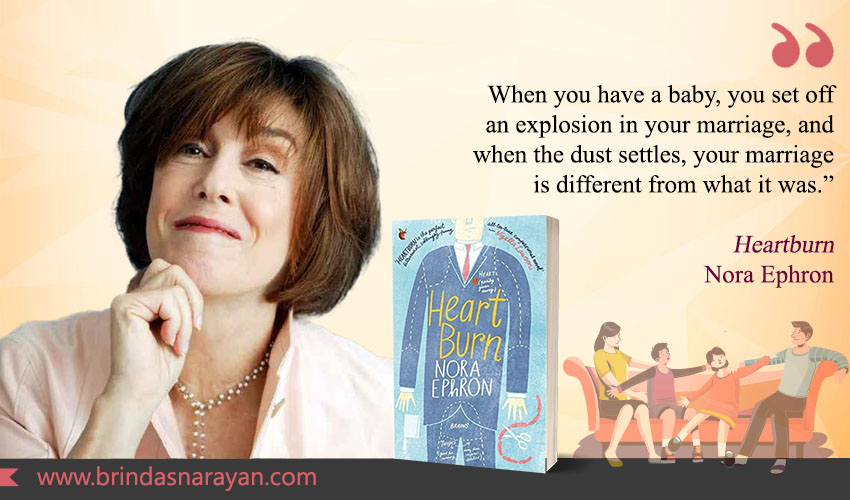
Nora Ephron’s Recipe for a Second Marriage (And a Second Breakup)
In her Introduction to Heartburn, Nora Ephron, observes how women novelists are often diminished for borrowing stuff from their own lives. Often, with the aspersion that their novels are memoirs, “thinly disguised.” It’s not as if male writers do not rake through the skeletal remains of past marriages or other story-worthy life events. With her trademark wit, Ephron admits, “I thinly disguised myself by making myself considerably more composed than I was at the time, and I thinly disguised my ex-husband by giving him a beard that belonged to one of my friends.”
This then is the story of a second marriage. Or rather the story of a second breakup. That begins with Rachel Samstat discovering that her second husband is having an affair. To top it all, she’s not in any position to start dating. She’s seven months pregnant. While also having to parent her son, who’s still a toddler.
The affair comes to light in a children’s book that was inscribed with a note from the marriage-shattering tall woman. Which only emphasizes how wretched or absurd the situation is. Rachel is busy being a mother, maybe an understandably crabby one because her husband is hardly around and now she has to contend with a strange chicken-and-egg dilemma: Is he not there because she’s crabby or is she crabby because he’s not there?
Ephron piles on the indignities. Thelma, the woman he was having the fling with, had just come over to Rachel’s place for dessert. With her husband, Jonathan. As Rachel casts her mind into the past, she realizes that Mark – the philandering hubbie – had been at it for seven months. Ever since he had started visiting the “dentist” without complaint.
Rachel is a cookbook writer. For the past few years, she’s been cooking (at home and on TV), and mothering and home-renovating. But also, like many women, feeling utterly futile. She talks about how time seems to “slow to a crawl” when you’re married.
Mark is a columnist. So he’s always seeking material in their life. Sometimes, Rachel feels like she’s living with a cannibal. Someone who’s perennially stringing out situations in their life for material. Even the stuff that happened to her was appropriated or taken by him. Till she started feeling that nothing was happening to her anymore. Ironically, this fling feels like something is happening to her. At last.
Rachel’s mother worked at Hollywood as an agent, casting midgets and when that went out of fashion, men with scars. She wasn’t maternal to begin with. “Even in the old days, my mother was a washout at hard-core mothering…” In any case, the non-maternal mother can no longer be Rachel’s recourse, because she’s dead. Instead Rachel calls up her therapist, Vera Maxwell. Vera, given to expressing her not-so-therapist-like opinions, says, “He’s disgusting.” Perhaps Rachel needed to hear just that.
She flies to her Dad’s apartment in New York. Her Dad isn’t around, and when the doorbell rings, it’s Jonathan, Thelma’s husband. Who makes the situation worse by saying he still loves Thelma. And then goes on to list all the gifts and hotel rooms with room service and bouquets that Mark had been generously bestowing on his wife. All this while Mark brought Rachel “a bunch of wilted zinnias.”
She heads to group therapy. She takes the subway where a Japanese tourist is clicking pics and she even smiles at him. “Then I thought of how awful it would be to be single again, how awful to be back on the market with the old New York ratio going against me, two hundred single women to every straight single man…”
Her mind keeps looping back to the past, to what was actually happening versus what she thought was happening. To the way she had missed seemingly obvious signs. Or perhaps, how she had known all along, but had stuffed that knowledge into her subconscious, and blinded herself to it. “When something like this happens, you suddenly have no sense of reality at all. You have lost a piece of your past.”
Her first husband, Charlie, was stingy and neurotic about his hamsters. There were times in her marriage, when she actually prayed for him to die, so she could attend the funeral, and flirt at the funeral. Of course, he didn’t die. She divorced him. Without the slightest remorse.
Mark turns up in New York, at her father’s apartment, and apologizes in a pathetically insufficient, half-hearted manner. He doesn’t even act the part of feeling sorry towards his betrayed wife. Then he cries. At this point, Rachel thinks that the culture should stop encouraging men to cry, because they never really cry for others. They only cry for themselves.
She apologizes for not working enough recipes into the story, because it has too much plot. She can’t insert recipes in the midst of so much forward plot. But she does manage to weave in a few, with the generous sticks of butter she slathers into this and that (quite often, potatoes) feeling like acts of cathartic violence.
If you’re in the mood for something funny and heartbreaking with an ‘80s kind of vibe (and who doesn’t want to occasionally escape our digital-addled world?), pick this for a weekend read. Those who haven’t read her books might have watched When Harry Met Sally. Even if some of her material may not hold up to contemporary woke lenses, Ephron can do snark, as few others can. She gets life, and herself, and despite all her foibles, and everything that life heaps on her, emerges on top: “Because if I tell the story, I control the version.”
References
Nora Ephron, Heartburn, Virago Press, 1996 (First published by William Heinemann Ltd, 1983).




